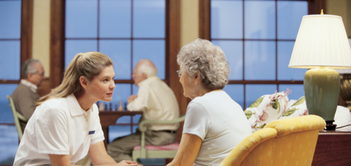
One was harassed about her weight. One came forward to say that people whispered about his wheelchair. Another knew people were laughing at the way she did her hair. These are not stories from high school. They are stories from senior residences, where bullying is more prevalent than most people think.
What does bullying look like in a senior residence?
“Bullying in senior residences looks a lot like bullying in high school,” says Donna Goodridge, RN, PhD, a member of the Respirology, Critical Care and Sleep Medicine faculty at the University of Saskatchewan. For example Gladys,* a woman with weight issues, moved into a retirement residence. The first day she went grocery shopping, she came home with her groceries and walked through the common area to the elevators. The elevators are in an open space that the residents use for congregating and people-watching: Everyone knows what is going on in the building and can see everyone’s comings and goings. This is great for security but not great for Gladys, who was faced with comments like the following from her fellow residents:
“Why does she need that much food? She lives alone.”
“Maybe if she didn’t eat all that food, she wouldn’t be so fat.”
Gladys eventually started coming in the back entrance, hauling her groceries up four flights of stairs. She was exposing herself to a risk of falls and over-exertion, all to escape the bullying she faced.
Why does bullying happen in senior residences?
Through her research and experience in senior residences, Goodridge has some theories: “I believe that many seniors are at a point in their lives where they have experienced a significant amount of grief and loss. Sometimes, things are very out of control for them. Exhibiting bullying behaviours can be an attempt to exert some control over their lives and their environment.”
Another reason could be internalized ageism. Goodridge remembers taking her own mother to look at a retirement residence and hearing her say, “I can’t live there! Everyone there is old!” Seniors may be understandably unwilling to identify as “old” in a culture that aligns worth with youth, productivity and independence. Older adults who have internalized ageist ideas may resent visible reminders of aging (such as mobility devices) in the people around them.
Goodridge also notes that the problem of bullying is predictable when, within a senior residence, you have a group of people who likely have different values and different ways of interacting. Problems often arise when you have a mixed group of people who have to find a way to share space and live together.
How can I tell if my loved one is being bullied?
Look for the following signs:
- Social isolation: If your loved one no longer wants to engage in social activities, stays in his or her room and does not want to go grocery shopping, try to find out why.
- Lack of sleep: The stress of experiencing bullying can have an impact on sleep.
- Inability to eat: Again, related to stress. If your loved one has lost their appetite, ask questions or respectfully voice your concerns.
- Heightened anxiety or stress around the mention of a location or an individual. If your loved one says, “I don’t want to go there,” or that they want to avoid a certain person, try to discover why.
What is the solution?
Goodridge is based in Saskatoon and is working with a team in Winnipeg to implement a Building Bridges program that teaches seniors empathy, communication skills and tools to help them adjust to a communal living environment. She is at the beginning of her work, but, in the absence of widespread programs, you can ask the directors of your loved one’s residence to instigate a code of conduct and to provide regular information sessions that discuss empathy, compassion and communication.
Goodridge has also found through her research that allowing seniors to share their stories can be a way to release stress. Gladys felt she was the only one. When she shared her story and was told that bullying in senior residences was a widespread phenomenon, she felt immense relief. “I don’t want this to happen to other people, but I feel better knowing I am not alone; that I am normal.” We have all been bullied at one point or another, but bullying does not have to define our later years.
If you suspect a loved one is being bullied in a senior residence, do not hesitate to help and work to make change.
*Name has been changed to protect privacy
![Duel-Logo-CFC-AYS[rgb]](https://blog.comforcare.ca/hs-fs/hubfs/Duel-Logo-CFC-AYS%5Brgb%5D.jpg?width=525&name=Duel-Logo-CFC-AYS%5Brgb%5D.jpg)